实验4
一.任务1
1.
#include<stdio.h> #define N 4 int main() { int a[N] = { 2,0,2,3 }; char b[N] = { '2','0','2','3' }; int i; printf("sizeof(int)=%d\n", sizeof(int)); printf("sizeof(char)=%d\n", sizeof(char)); printf("\n"); for (i = 0;i < N;++i) printf("%p:%d\n", &a[i], a[i]); printf("\n"); for (i = 0;i < N;++i) printf("%p:%c\n", &b[i], b[i]); printf("\n"); printf("a=%p\n", a); printf("b=%p\n", b); return 0; }
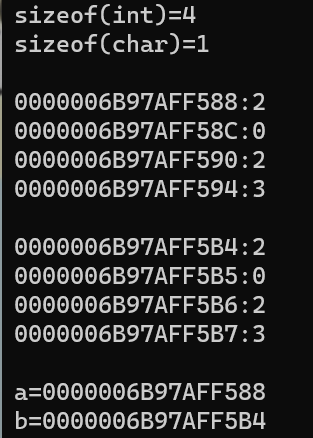
2.
#include<stdio.h> #define N 2 #define M 3 int main() { int a[N][M] = { {1,2,3},{4,5,6} }; char b[N][M] = { {'1','2','3'},{'4','5','6'} }; int i,j; for (i = 0;i < N;++i) for(j=0;j<N;++j) printf("%p:%d\n", &a[i][j], a[i][j]); printf("\n"); printf("a=%p\n", a); printf("a[0]=%p\n", a[0]); printf("a[1]=%p\n", a[1]); printf("\n"); for (i = 0;i < N;++i) for (j = 0;j < M;++j) printf("%p:%c\n", &b[i][j], b[i][j]); printf("\n"); printf("b=%p\n", b); printf("b[0]=%p\n",b[0]); printf("b[1]=%p\n",b[1]); printf("\n"); return 0; }
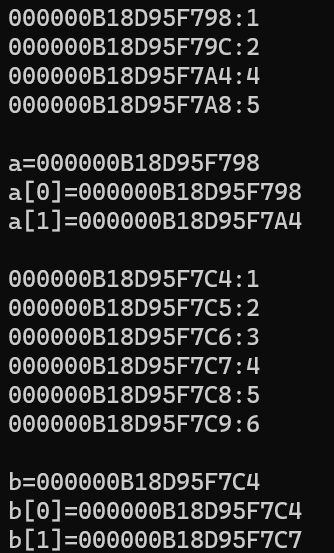
二.任务2
#include <stdio.h> #include <string.h> #define N 80 void swap_str(char s1[N], char s2[N]); void test1(); void test2(); int main() { printf("测试1:用两个一维数组,实现两个字符串交换\n"); test1(); printf("测试2:用二维数组,实现两个字符串交换\n"); test2(); return 0; } void test1() { char views1[N] = "hey, C, I hate u."; char views2[N] = "hey, C, I love u."; printf("交换前:\n"); puts(views1); puts(views2); swap_str(views1, views2); printf("交换后: \n"); puts(views1); puts(views2); } void test2() { char views[2][N] = { "hey, C, I hate u.", "hey, C, I love u." }; printf("交换前:\n"); puts(views[0]); puts(views[1]); swap_str(views[0], views[1]); printf("交换后: \n"); puts(views[0]); puts(views[1]); } void swap_str(char s1[N], char s2[N]) { char tmp[N]; strcpy_s(tmp,N,s1); strcpy_s(s1,N,s2); strcpy_s(s2,N,tmp); }
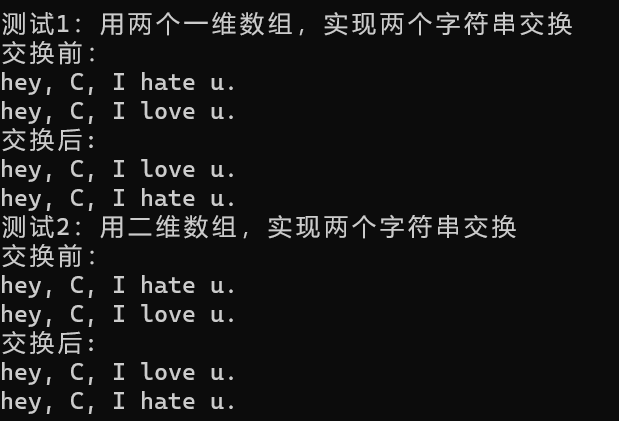
三.任务3
1.
#include <stdio.h> #define N 80 int count(char x[]); int main() { char words[N + 1]; int n; while (gets_s(words) != NULL) { n = count(words); printf("单词数:%d\n\n", n); } return 0; } int count(char x[]) { int i; int word_flag = 0; int number = 0; for (i = 0;x[i] != '\0'; i++) { if (!((x[i] >= 'a' && x[i] <= 'z') || (x[i] >= 'A' && x[i] <= 'Z'))) word_flag = 0; else if (word_flag == 0) { word_flag = 1; number++; } } return number; }
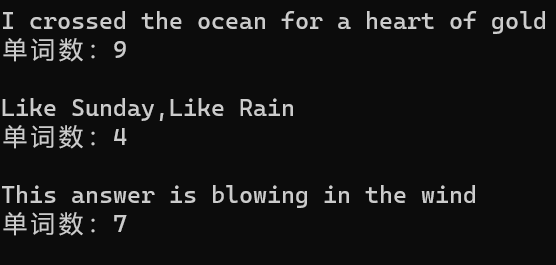
2.
#include<stdio.h> #define N 1000 int main() { char line[N]; int word_len; int max_len; int end; int i; while (gets_s(line) != NULL) { word_len = 0; max_len = 0; end = 0; i = 0; while (1) { while (line[i] == ' ') { word_len = 0; i++; } while (line[i] != '\0' && line[i] != ' ') { word_len++; i++; } if (max_len < word_len) { max_len = word_len; end = i; } if (line[i] == '\0') break; } printf("最长单词:"); for (i = end - max_len;i < end;++i) printf("%c", line[i]); printf("\n\n"); } return 0; }
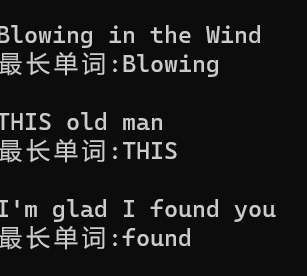
四.任务4
#include<stdio.h> #define N 5 void input(int x[], int n); void output(int x[], int n); double average(int x[], int n); void bubble_sort(int x[], int n); int main() { int scores[N]; double ave; printf("录入%d个分数:\n", N); input(scores, N); printf("\n输出课程分数:\n"); output(scores, N); printf("\n课程分数处理:计算均分、排序...\n"); ave = average(scores, N); bubble_sort(scores, N); printf("\n输出课程均分:%.2f\n", ave); printf("\n输出课程分数(高 -> 低):\n"); output(scores, N); return 0; } void input(int x[], int n) { int i; for (i = 0;i < n; i++) scanf_s("%d", &x[i]); } void output(int x[], int n) { int i; for (i = 0;i < n; i++) printf("%d ", x[i]); printf("\n"); } double average(int x[], int n) { double s = 0; int i; for (i = 0;i < n; i++) s += x[i]; return s / n; } void bubble_sort(int x[], int n) { int i, j; for (i = 0;i < n; i++) for (j = n - 1;j > i; j--) if (x[j] > x[j - 1]) { int t = x[j]; x[j] = x[j - 1]; x[j - 1] = t; } }
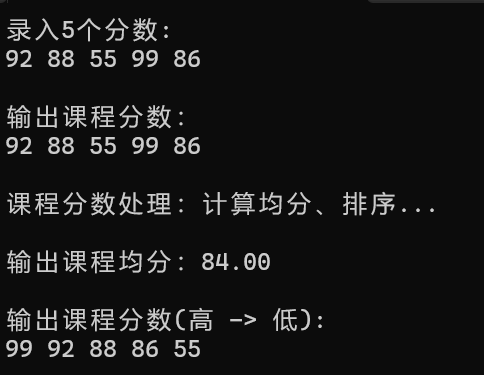
五.任务5
#include<stdio.h> #define N 100 void dec2n(int x, int n); int main() { int x; printf("输入一个十进制整数:"); while (scanf_s("%d", &x) != EOF) { dec2n(x, 2); dec2n(x, 8); dec2n(x, 16); printf("\n输入一个十进制整数:"); } return 0; } void dec2n(int x, int n) { char m[16] = { '0','1','2','3','4','5','6','7','8','9','A','B','C','D','E','F' }, t[N]; int i, o, p; for (i = 0, o = 0, p = x;p > 0;i++) { o = p % n; p = p / n; t[i] = m[o]; } t[i] = 0; for (;i >= 0;i--) printf("%c", t[i]); printf("\n"); }

六.任务6
#include<stdio.h> #define N 100 #define M 4 void output(int x[][N], int n); void rotate_to_right(int x[][N], int n); int main() { int t[][N] = { {21,12,13,24}, {25,16,47,38}, {29,11,32,54}, {42,21,33,10} }; printf("原始矩阵:\n"); output(t, M); printf("变换后矩阵:\n"); rotate_to_right(t, M); return 0; } void output(int x[][N], int n) { int i, j; for (i = 0;i < n;++i) { for (j = 0;j < n;++j) printf("%4d", x[i][j]); printf("\n"); } } void rotate_to_right(int x[][N], int n) { int i, j; for (i = 0;i < n;++i) { for (j = 0;j < n;++j) { if (j == 0) printf("%4d", x[i][n - 1 - j]); else printf("%4d", x[i][j - 1]); } printf("\n"); } }
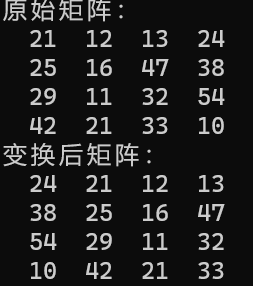
七.任务7
1.
#include <stdio.h> #include <stdlib.h> #define N 80 void replace(char x[],char old_char,char new_char); int main(){ char text[N]="C programming is difficult or not,it is a question."; printf("原始文本:\n"); printf("%s\n",text); replace(text,'i','*'); printf("处理后文本:\n"); printf("%s\n",text); system("pause"); return 0; } void replace(char x[],char old_char,char new_char){ int i; for(i=0;x[i]!='\0';++i) if(x[i]==old_char) x[i]=new_char; }

2.
#include <stdio.h> #include <stdlib.h> #define N 80 int main() { char str[N], ch; int i; printf("输入字符串:"); gets(str); printf("输入一个字符:"); ch = getchar(); printf("截断处理……"); i = 0; while (str[i] != '\0') { if (str[i] == ch) break; ++i; } str[i] = '\0'; printf("\n截断处理后字符串:%s\n", str); return 0; }

八.任务8
#include <stdio.h> #include <stdlib.h> #include <string.h> #define N 5 #define M 20 void bubble_sort(char str[][M], int n); int main() { char name[][M] = { "Bob","Bill","Joseph","Taylor","George" }; int i; printf("输出初始名单:\n"); for (i = 0;i < N;i++) printf("%s\n", name[i]); printf("排序中...\n"); bubble_sort(name, N); printf("\n按字典序输出名单:\n"); for (i = 0;i < N;i++) printf("%s\n", name[i]); system("pause"); return 0; } void bubble_sort(char str[][M], int n) { int i, j; char tmp[M]; for (i = 0;i < n; i++) for (j = n - 1;j > i; j--) if (strcmp(str[j], str[j - 1]) < 0) { strcpy_s(tmp, str[j]); strcpy_s(str[j], str[j - 1]); strcpy_s(str[j - 1], tmp); } }
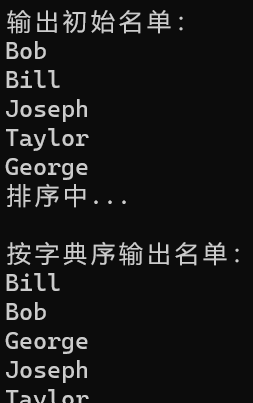




 浙公网安备 33010602011771号
浙公网安备 33010602011771号